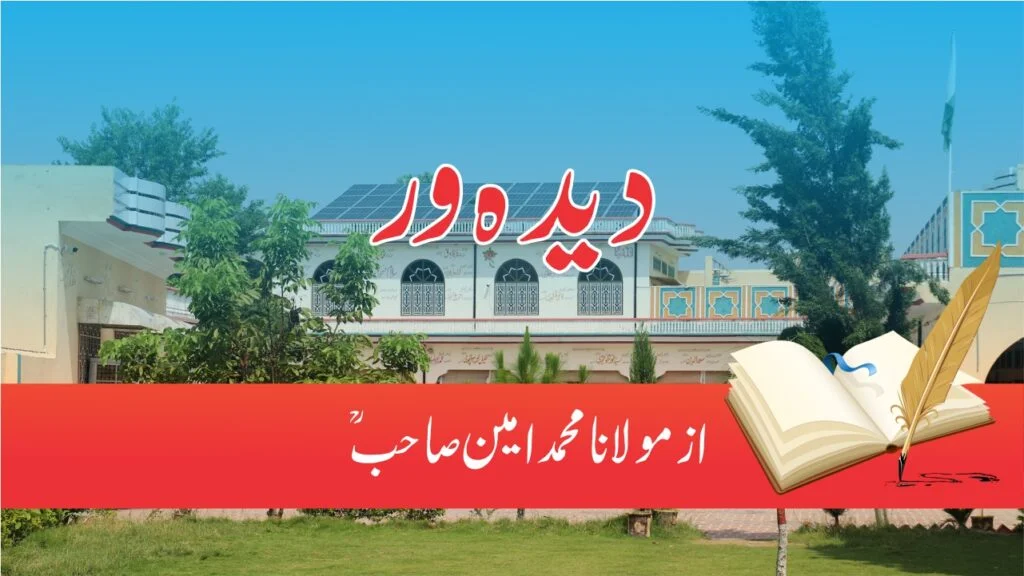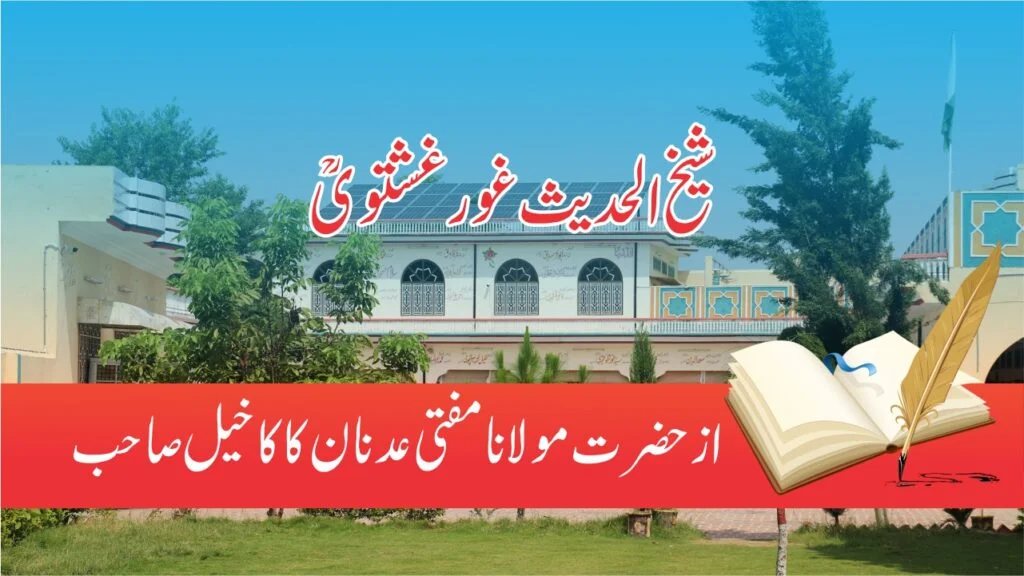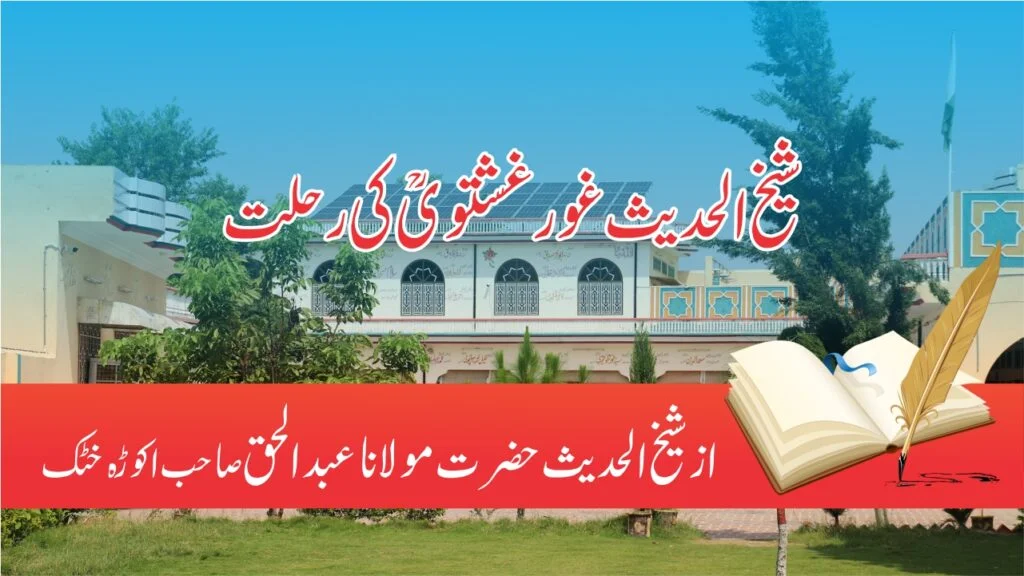ہزاروں سال نرگس اپنی بے نوری پے روتی ہے
بڑی مشکل سے ہوتا ہے چمن میں دیدہ ور پیدا
My Master and Leader, Shaykh Al-Hadith (may Allah have mercy on him), was a radiant and distinguished star in the heavens of knowledge and understanding. He appeared on the horizon of Ghorghushti during a time when disbelief, atheism, polytheism, innovations, ignorance, and misguidance layered upon one another like dark clouds. For almost sixty years, he spread the light of guidance, knowledge, and understanding. Ultimately, on the 5th of Dhu al-Qa’dah, as the physical sun rose, his spiritual sun set in the military hospital of Wah Cantt. His passing created a profound void in the intellectual and spiritual circles, deeply felt by the scholars of the time. Various individuals expressed their grief in different ways. Even those of us who might be indifferent came to realize that seekers of piety and purity were deprived of a guiding star, and particularly the region of the Frontier was left orphaned. It was as though the words, “The death of a scholar is the death of a world,” became a clear and tangible reality.
The renowned religious journal of Pakistan, Tarjuman-e-Islam, resolved to publish a special issue dedicated to him, which was expected, as the preservation of the names of predecessors and the invitation towards their exemplary character is its pride. I intended several times to pen a few lines, but considering the high and exalted status of Shaykh Al-Hadith Hazrat Maulana Naseeruddin of Ghorghushti (RA) (may Allah have mercy on him), I hesitated, feeling unworthy to write anything about him. As the saying goes, “How can the dust reach the stars, and how can one compare the humble with the sublime?” A proper commentary can only be made when the commentator has full knowledge of the subject.
In the end, I concluded that although it is impossible to do justice, simply being counted among his eulogists is a great honor. Therefore, with utmost reverence, I present these few lines as a token of my devotion to him. The complete picture of his exemplary life will, God willing, be reflected in the writings of other scholars and learned people, for “only those with virtue can truly recognize virtue.” Nonetheless, I offer these humble observations in the hope that they may become a source of divine mercy, for “God’s mercy descends when the pious are remembered.”
Various Aspects of Shaykh’s Life
Shaykh (may Allah enlighten his resting place) had many aspects to his life, each possessing its own unique appeal.
کسی ادا پہ جان دوں تو بتا اے چشم یار! ہر طرف کے دیکھتا ہوں ،حُسن کی تصویر ہے
If I were to lose myself to any one charm, O beloved! I look everywhere, and all I see is beauty.
He was a community unto himself, an institution even, but the truth is that the work Allah took from him is something no single institution, or even several combined, could accomplish. From an academic perspective, at once he was a scholar of Hadith, an exegete of the Quran, a jurist, and a master of many fields. From a practical standpoint, he was reminiscent of the early generations of Muslims, whose words and actions were infused with the Prophetic Sunnah.
As a spiritual guide, he was a living embodiment of the Quranic verse: “Those who believed and were conscious of God”, and the Hadith: “When they are seen, the remembrance of Allah comes to mind.” His steadfastness on the straight path of the Sharia was unparalleled, a steadfastness that is the true mark of a saint of Allah. In front of this steadfastness, thousands of miraculous occurrences seemed insignificant.
From a moral standpoint, he was a model of balance, a beautiful blend of majesty and grace. His simplicity, sincerity, piety, and detachment from worldly pursuits were such that they would remind one of the noble companions of the Prophet (may Allah be pleased with them).
In short, Allah bestowed upon him a combination of many perfections, and no words can fully capture them.
ولی تفنن واصفية بوصفه يغنى الزمان وفيه ما لم يوصف
“To describe his qualities is to outdo time itself, for there are qualities in him yet to be described.”
His Influence
Those familiar with him know that his influence in Pakistan’s northwestern region, tribal areas, and Afghanistan was akin to the influence that the great Shah Abdul Haq Muhaddith Dehlavi (may Allah have mercy on him) had in his time. Through his blessed presence, vast areas became illuminated by the teachings of the Hadith of the Prophet Muhammad (peace and blessings be upon him). Nearly every major town had people who had benefited from his knowledge. This is a favor upon the region that will not be forgotten for centuries to come.
Furthermore, through his spiritual influence, millions were affected, abandoning ignorant customs and innovations. Countless individuals turned away from lives of sin and pledged allegiance to him, and many were saved from the harmful clutches of misguiding leaders. His reform efforts were so impactful that it’s difficult not to regard him as a reviver of the faith in this region. Due to his influence, many Sunnah practices were revived, and numerous innovations were abolished. The spread of monotheism and the Prophetic Sunnah through him far exceeded the efforts of many so-called preachers of monotheism. However, it is surprising that despite his clear and evident efforts, some detractors still criticized him, failing to see his obvious contribution.
وَمَنْ لَمْ يَجْعَلِ اللَّهُ لَهُ نُورًا فَمَا لَهُ مِنْ نُورٍ
These critics seem to have strange lenses through which all the pious members of the community, God forbid, appear as polytheists or at the very least, innovators. These individuals see the entire religion as a set of a few limited issues, regarding which there have been varying opinions among scholars. These few lines were written out of necessity and heartfelt pain. Otherwise, it is better to consider such people excused, especially when their significance does not warrant attention to their criticisms.
وَاللَّهُ يَهْدِي مَنْ يَشَاءُ إِلَى صِرَاطٍ مُسْتَقِيمٍ
There are many beautiful aspects of Sheikh’s life, but detailing them is beyond our ability or the scope of this space. If a fortunate soul ever writes a full biography of Sheikh, they will shed light on these aspects. For now, we suffice with the saying:
دامان نگہ تنگ و گل و حسن تو بسیار گل چین بہار تو زداماں گلہ دارد
Outstanding Traits
The most prominent trait of Sheikh (may Allah sanctify his resting place) was his sincerity and devotion to Allah, a quality that is the essence of worship. The Quran emphasizes its importance in various places, as in the verse:
وَمَا أُمِرُوا إِلَّا لِيَعْبُدُوا اللَّهَ مُخْلِصِينَ لَهُ الدِّينَ
And another verse:
أَلَا لِلَّهِ الدِّينُ الْخَالِصُ
The Prophet (peace and blessings be upon him) said:
انما الأعمال بالنيات
He never took any compensation for his religious services, nor did he ever seek any form of self-promotion. The widespread acceptance he achieved was solely granted by Allah, and it was a fulfillment of the divine promise, “Indeed, those who believe and do righteous deeds – the Most Merciful will bestow upon them affection.” Initially, it was the religious scholars and the pious who established a connection with him, and later the general public began to develop a deep love for him. This is a clear sign of a person being accepted in the sight of Allah.
The number of scholars who graduated under his guidance is unparalleled, not only in Western Pakistan but likely in any other institution of the region. However, very few people are aware of this significant fact. Through his continuous efforts, the educational policy of the Afghan nation underwent a revolution, but this man of God never hinted at his role in this transformation.
Another distinguishing feature of the esteemed Shaykh was the widespread dissemination of religious knowledge. A significant portion of his life was devoted to this noble cause, and for almost forty years, he selflessly taught the Qur’an, Hadith, and Islamic jurisprudence. The number of attendees in his study circles was almost equivalent to those present at the esteemed scholars of Darul Uloom Deoband at the time, with the exception of Shaykh Madani. His lessons were delivered in the traditional method of the pious predecessors, with his unique understanding of Hadith and Fiqh. As a result, his students were deeply inspired by the teachings of the Sunnah and developed a strong aversion to innovation, while maintaining respect for the interpretations of the predecessors, except for a few who deviated.
One can gauge the depth of his understanding of Hadith and Fiqh from his annotations on “Mishkat al-Masabih.” Just as the annotations of Shaykh Ahmad Ali on Sahih al-Bukhari provide sufficient insight for readers, similarly, his notes on Mishkat al-Masabih serve as a comprehensive guide. I once came across a manuscript of Tafsir al-Baydawi, in which someone had recorded Shaykh’s lecture notes, revealing his thorough and insightful teaching style.
The third notable quality evident in his character was his adherence to piety and the prophetic traditions. Those who were close to him bear witness to the fact that he was not only committed to the Sunnah in worship but also in his morals and manners. Following the Sunnah became second nature to him. After reading about Shaykh Gangohi’s life in “Tadhkirat al-Rashid,” I personally observed these same qualities in him whenever I had the honor of meeting him.
A fourth remarkable aspect of his life was his immense passion for the protection and elevation of true religion. Whenever the enemies of religion plotted against it, he stood side by side with the scholars of truth to counter their efforts. Among the most important religious movements of recent times was the one to safeguard the honor of the Prophet ﷺ as the Seal of Prophets, against which some British-backed traitors launched an attack. Shaykh played a significant role in this movement. Despite his old age and frailty, he personally endured the hardships of imprisonment alongside his son, with unwavering patience and courage.
Whenever the need arose, he never hesitated to speak the truth. He was a staunch supporter of the Jamiat Ulema-e-Islam, the most influential and representative political party of the truth. He always encouraged his followers to support the organization and remained loyal to it throughout his life. I still vividly recall the words that came from his blessed tongue: “I learned to shoot a gun so that I could use it in jihad.”
Shaykh’s presence was a vital means of protecting the people of the frontier from falling prey to misguided sects. Thanks to him, the modern Sabaism, which appeared in the form of “Maududism,” was unable to gain a foothold in the region. Likewise, he blocked the path of modern-day Kharijism. Despite his natural aversion to disputes, he never hesitated to clearly express his views on these matters, issuing clear and decisive rulings without resorting to vague or diplomatic language, unlike those who compromised for the sake of expediency.
Alongside all these external activities, Shaykh also fulfilled the duty of spiritual guidance and reform. He widely spread the blessings of his mentor, Shaykh Husayn Ali, a great mujahid, a caller to Tawhid and Sunnah, and a pure-hearted Sufi of his time. With great steadfastness, this noble man waged jihad against shirk (polytheism) and bid’ah (innovation).
Shaykh’s life was imbued with the spirit of Imam Hussain. He kept alive the legacy of his mentor’s spiritual guidance, and countless people benefited from his teachings. Many hearts, once in distress, became illuminated with the light of divine knowledge and grew close to Allah and His religion. When he could no longer teach due to his frailty, he immersed himself in the remembrance of Allah, in accordance with the saying:
وعدہ وصل چوں شُد نزدیک آتش عشق تیز تر گردد
In the final years of his life, his yearning to meet his Beloved Creator grew so intense that he would express displeasure if anyone prayed for the prolongation of his life. For several years, this longing had made him restless to visit the sacred house of his Beloved, but the government’s misguided Hajj policy had obstructed his path. This year, after much waiting, permission was finally granted, but instead of being granted the opportunity to visit the holy sites, the Lord of the House rewarded this frail lover with eternal union.



